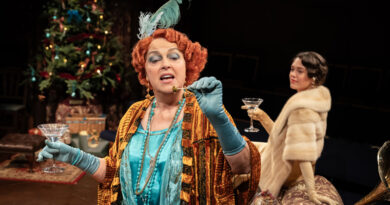“The Merchant of Venice”, Ivan Vazov National Theatre, Sofia
Sasho Ognenovski in Bulgaria
9 March 2025
The play intertwines three narratives that finally merge into one in an illustration of Shakespeare’s sheer technical craft. The society portrayed is a rational one and yet there is also an investigation of the transience of human spirituality.

Photo credit: Yana Lozeva.
Kindness and humanity do not end with individuals, but transcend them. We see spirituality that is an antithesis to mathematical precision and the harshness of obligation in the initial agreement between Antonio and Shylock. Shakespeare juxtaposes love and duty in this play, weighing their dominance. The relationship between Antonio and Portia in this production is almost imperceptible, lacking chemistry while the primary dynamic lies in the interactions between Shylock and Antonio, as well as Bassanio and Portia.
Reading this play, we are left with a crucial question: how does the Duke of Venice fail to recognize Portia disguised as the fictional Doctor Bellario, and Nerissa as Balthazar? The play presents a courtroom drama where the cunning Shylock is the plaintiff, and the “naïve” and not particularly capable Antonio is the defendant. Yavor Gardev boldly addresses this question with his innovative directorial concept, creating a performance that is deeply significant when it comes to the symbolic positioning of nobility, yet very “down to earth” when it comes to the action and the story itself. In this interpretation, we see an ambivalent Antonio, about whom Shakespeare provides little detail regarding personal life, entertained by Solanio and Salarino dancing around him.
The audience is presented with a completely logical and pragmatic Shylock—neither too old, hunched, nor ugly, enslaved by his own miserliness. We also see a more than usually intelligent Portia who must of course always be extremely bright to come up with her ruse. This Portia (Radina Kardjilova) who presents strong arguments when it comes to entering a romantic relationship.
However, the most innovative aspect of this interpretation is the absence of Portia and Nerissa in the courtroom scene. Instead, Bellario and Balthazar appear without requiring the audience to believe that the two women are merely disguised with moustaches and beards.
This challenges both the genre and the logic of the play’s events. Yavor Gardev immerses The Merchant of Venice in the turbulence of our modern era, where Shylock appears deeply pragmatic—and we believe in him. Why must the Jew be heartless, full of hatred, miserly, and useless to the world? At the height of his arguably justified rage, he delivers his famous speech including “If you prick us, do we not bleed?”
This interpretation by Yavor Gardev also questions the very semantics of love, the swearing of eternal fidelity, and the meaning of relics. It raises the question: how present are these concepts in our personal lives, and where does inner faith go if it has no place in society?
The production boasts an outstanding cast who articulate a contemporary interpretation of Shakespeare’s complex drama. Kardjilova portrays Portia with a subdued emotionality, allowing room for rationality. She is a wise noblewoman who values her social status but does not wish to confine her love within the cage of wealth. This technically skilled actor skillfully shapes the character, allowing her emotions to surface only as much as necessary. She constructs a lady who gives only to her heart to make the right choice for the person for her future marriage, while carefully assessing those who present themselves as suitors. Kardzhilova understands that Portia is not a one-dimensional character and plays her with dedication, maintaining a firm vocal line and a remarkable emotional depth. She knows how much Portia loves Bassanio and how she envisions a life with him, articulating this with wisdom and intensity.
Samuel Finzi’s Shylock is not only a Jew, he is a person with very important biography and very clear way of thinking according to his social position and his financial level. The brilliance of this great actor lies in his ability to portray a character who radiates pragmatism and elemental logic, without confining him to grotesque caricature. Watching his very wise interpretation of Shylock, one gets the impression that Shakespeare, in writing his play, leaned toward Shylock’s perspective—the character who suffers because Christians hurl insults at him, particularly Antonio, who has come to him seeking a loan. This interpretation of Shylock, one gets the impression that Shakespeare, in writing his play, leaned toward Shylock’s perspective —the character who suffers because Christians hurl insults at him, particularly Antonio, who has come to him seeking a loan.
Finzi’s monologues are especially impressive, as he lays bare the suffering of a man who appeals to the court for logic and fairness in his expectations, confronting the recklessness of the merchant who borrowed money without certainty of repayment. Finzi, creating his Shylock, being fantasticly skilled and creative in his speech and movement technique, ultimately speaks of the absurdity of human affections and fickleness.
Alexander Tonev’s Bassanio is equally remarkable—a dynamic, naïve, and honest character played with great devotion and passion. He is Antonio’s loyal friend, but in this interpretation, he ultimately becomes deeply disillusioned with Antonio’s integrity. This Bassanio is not merely emotional; Tonev performs him with rhetorical finesse, creating a character whose sole devotion is to his beloved Portia, but also to justice when it comes to social standing.
Plamen Dimov’s Gratiano deserves mention as well—a suggestive young man who, in many ways, serves as a contrast to his friend Bassanio. However, Dimov builds his character with precise intellectual awareness, mindful of the ever-present possibility of dramatic shifts.
Nencho Kostov plays Lorenzo, the lover of Shylock’s daughter, Jessica. He is an actor with broad expressiveness and a strong vocal range, portraying a young man for whom love is everything in the world. Kostov’s passionate portrayal transforms Lorenzo into a truly memorable role.
Pavel Ivanov also stands out as Antonio, crafting a fascinating character—a young, irrational merchant whose calculations have gone awry. He presents Antonio as an intriguing figure who carries within him the mystery of an undefined intimacy and sexuality.
The beauty of this production is elevated by the entire ensemble cast. Kaloyan Tirifunov and Asen Dankov bring to life Antonio’s peculiar companions, Salarino and Solanio. Katalin Stareyshinska presents an introverted Nerissa, while Pavlin Petrunov delivers a poignant performance as the wronged and perpetually melancholic Launcelot Gobbo. The production also features remarkable performances from actors such as Kremena Deyanova, Stelian Radev, Yavor Valkanov, Stefan Kishev, Zafir Radzhab, and Alexander Kanev. Notably, the distinguished Vladimir Penev makes an appearance as the Duke of Venice, further enriching this exceptional theatrical experience.
What is particularly interesting about this production is its multilingual approach, which adds a multicultural dimension. It connects the concept to the era in which the action takes place; often these two aspects seem disconnected in less thoughtful productions. This linguistic layer creates a strange form of civilizational convergence, making us ponder a multi-lingual almost Tower of Babel dystopian future of our own.
his is a visually rich production, with Nikola Toromanov’s scenography balancing antiquity with modern “exterior and interior” solutions, making it both topically relevant and fascinating. By marking the noble houses with Latin inscriptions while incorporating projections of Portia’s suitors and footage from interior cameras, the set design echoes the eccentricity of contemporary architecture and interior aesthetics in this peculiar 21st century. Complementing this is Svila Velichkova’s costume design, which emphasizes bold colours and a refined modernization of formal suits, occasionally adorned with knightly elements.
One of the most striking aspects is Kalin Nikolov’s music which plays a dominant role in the performance; it feels like an essential character in itself, giving a unique pulse to the entire action. His creative musical space reaches the contrast of the time flowing, using the rhythm which corresponds with the modern impulse, involving some archaic motives. Another highlight is the very interesting choreography by Andrea Gavriliu, concentrated in the dancing pieces in this show and giving to it a sort of orientalist observations which extends the mystical aspect of it.
The Merchant of Venice reminds us that free-spiritedness does not necessarily equate to deep understanding, and that love can only truly surrender to the heart when we are in darkness, hidden from the rest of the world. Yavor Gardev presents a truth that we may choose to embrace as inspiration or reject as unnecessary. This production offers a philosophical interpretation of Shakespeare’s complex drama. Perhaps we should hold onto our instincts, for even when they deceive us, they ultimately make us stronger—while loyalty is best left to those whose fate has already arranged all the cards in order.









